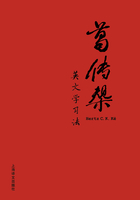
READING ALOUD
Do you ever read aloud? The chances are that you do not now read aloud. You used to
that you do not now read aloud. You used to read aloud when you were a small child. But you ceased to read aloud at fourteen or fifteen. If I’m not mistaken,
read aloud when you were a small child. But you ceased to read aloud at fourteen or fifteen. If I’m not mistaken, among certain boys and girls late in their teens
among certain boys and girls late in their teens reading aloud is now a lost art.
reading aloud is now a lost art.
You may protest, “What
“What if I were to read aloud,when I do not read aloud and yet understand?” Well,much would come of
if I were to read aloud,when I do not read aloud and yet understand?” Well,much would come of reading aloud. Reading aloud helps you to learn by heart,
reading aloud. Reading aloud helps you to learn by heart, and learning by heart is essential to all who aim at writing well. Reading aloud helps you to cultivate good pronunciation and good intonation,
and learning by heart is essential to all who aim at writing well. Reading aloud helps you to cultivate good pronunciation and good intonation, and good pronunciation and good intonation are essential to all language learners. Reading aloud helps you to discover certain beauties of language that you may fail to see in your silent reading. Unless you read aloud,you cannot learn to write naturally or to appreciate
and good pronunciation and good intonation are essential to all language learners. Reading aloud helps you to discover certain beauties of language that you may fail to see in your silent reading. Unless you read aloud,you cannot learn to write naturally or to appreciate literature.
literature.
And I think that it is partly because they do not read aloud that many Chinese learners of English cannot read poetry. A certain English man of letters
A certain English man of letters has said that a poem is not a poem until it is read;and evidently by “read” he means read aloud. A poem is
has said that a poem is not a poem until it is read;and evidently by “read” he means read aloud. A poem is something to be read aloud. There are many poems that you may learn to like and enjoy by reading them aloud,though you find several difficult points in them. On the other hand,you may understand a poem merely as you understand a piece of matter-of-fact prose,
something to be read aloud. There are many poems that you may learn to like and enjoy by reading them aloud,though you find several difficult points in them. On the other hand,you may understand a poem merely as you understand a piece of matter-of-fact prose, if you do not read it aloud. “The Raven” by Edgar Allan Poe,
if you do not read it aloud. “The Raven” by Edgar Allan Poe, for example,is a very beautiful poem. But its beauty depends largely upon its wonderful music. Below is its first stanza.
for example,is a very beautiful poem. But its beauty depends largely upon its wonderful music. Below is its first stanza. Try first to read it silently as though
Try first to read it silently as though it were a business letter
it were a business letter and then to read it aloud,and compare the two impressions.
and then to read it aloud,and compare the two impressions.
Once upon a midnight dreary, while I pondered,
while I pondered, weak and weary,
weak and weary,
Over many a quaint and curious volume of forgotten lore,
While I nodded ,nearly napping,
,nearly napping, suddenly there came a tapping,
suddenly there came a tapping,
As of some one gently rapping,
some one gently rapping, rapping at my chamber
rapping at my chamber door.
door.
“’Tis some visitor”,I muttered,
some visitor”,I muttered, “tapping at my chamber door —
“tapping at my chamber door —
Only this and nothing more”.